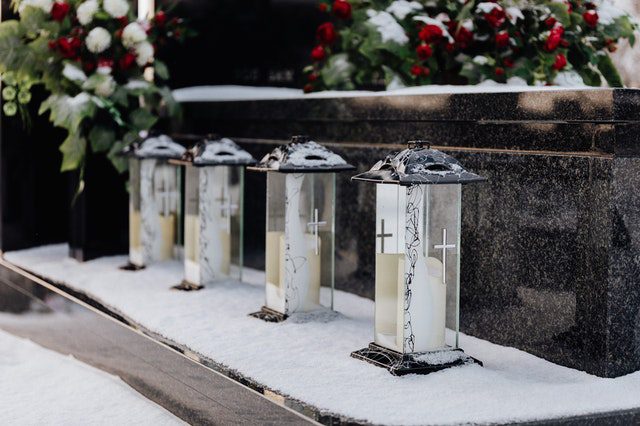
Remembrance, Lament, and Celebration
March 18, 2021Jeremy Taylor
Anniversaries are important. Not only do they present an occasion to remember the significance of an event, they also provide an opportunity for us to reflect on God’s work and provision in our lives. We celebrate birthdays and wedding anniversaries for precisely this reason. We may commemorate the date of a loved one’s passing. The significant events of our lives are important, and it is psychologically and spiritually beneficial to us to remember them.
It’s also biblical. In Exodus 14, when God was preparing the people of Israel for their dramatic escape from Egypt, he told Moses, “This is a day to remember. Each year, from generation to generation, you must celebrate it as a special festival to the Lord. This is a law for all time.” The Israelites were to remember what God had done for them and celebrate his mighty act of deliverance year after year.
The Bible also indicates that it is appropriate to remember tragedy. In 2 Chronicles 35, after King Josiah died in battle, the prophet Jeremiah composed a series of laments for the godly king—“songs of sorrow [that] have become a tradition.” Christians today celebrate the Lord’s Supper as a way of commemorating Jesus’ death, a practice instituted by Jesus himself. And of course, each year we remember Jesus’ crucifixion on Good Friday and his resurrection on Easter.
In the spring of 2020, the entire world was rocked by the COVID-19 pandemic. As the weeks and months went by, it was clear that rather than a minor blip in the world’s plans, the pandemic would have an irrevocable impact on individuals, families, communities, and nations. A year later, it is appropriate for us to commemorate the anniversary of this world-changing crisis both to lament the tragic loss of life around the world and the massive change in plans endured by schools, churches, businesses, and governments, but also to give thanks to God for his provision during the past year.
In my family, a tradition we have is that on the night before each child’s birthday, we gather together and recount the “birth story”—the story of the circumstances and emotions surrounding that important day so many years ago. This helps us remember more than just the event itself. So I’d like to take a moment to recount the story of the earliest days of the pandemic at Tyndale House as a way of remembering not only the circumstances but also the emotional significance of what transpired.
The story for Tyndale begins weeks before most of the world had even heard the term “COVID-19.” In February, well before lockdowns and mask mandates, it was already clear that 2020 was shaping up to be a rough year for Tyndale financially. Sales were down. We didn’t have any bestselling books projected for the year. We were anticipating needing to tighten our belts and make some sacrifices. On February 27, the Corporate Management Committee met to discuss the financial outlook. We talked about what adjustments we might need to make to corporate spending. We also talked about what could happen if there was a significant outbreak of the coronavirus in the United States—something that at that point was still largely viewed as a possibility but not an inevitability.
A few days later, on March 3, the Tyndale House Foundation Board made the decision to withdraw funds from the Foundation’s endowment in order to make up for the fact that revenue from the publishing division was down. By then, it was becoming clearer day by day that the “novel coronavirus” was going to be a big problem, but it still didn’t seem like an immediate threat.
That outlook changed within a week. On March 11, the World Health Organization officially labeled COVID-19 a pandemic. That same day, Wheaton College announced that they were sending students home for an early Spring Break in order to stave off an outbreak on campus. Two days after that, on March 13, Tyndale executives met to discuss the implications of the pandemic. The decision was made to recommend that anyone able to work in the office should continue to do so, but anyone who preferred to work from home could do that. That afternoon, it was announced that local public schools in the Chicago area were shutting down and switching to online learning.
That was a Friday. Over the weekend, events continued to move very quickly. On Monday morning, March 16, the executives met as usual at 7 a.m., but this time we met in the boardroom so there would be more room to spread out. The idea of “social distancing” was still very new, but we were doing our best to pay attention to what was going on. By the end of that meeting, we decided to ask Tyndale employees to work from home for the next two weeks. “Two weeks to flatten the curve” was the phrase being used in the media, and we decided to participate in that.
On March 18, Tyndale House Foundation staff set up a special email address for grantees and partners to submit prayer requests. Two days later, the governor of Illinois issued an official stay-at-home order. The next day, Tyndale extended its own work-from-home policy for an additional two weeks.
On March 23, I met by Zoom with several other foundation leaders to discuss the impact of the pandemic on our grantmaking budgets and allocation plans. The mood was pretty glum. Most of the other major Christian foundations were having to reduce their giving significantly, and it was clear there would be massive financial implications worldwide from the pandemic.
On March 24, I instituted a daily prayer time for THF staff to pray for our grantees. That continued for many months as together we lifted the needs of our partners around the world before the Lord. Meanwhile, a Tyndale employees’ Facebook page was created, and we began using that as a way to share prayer requests with the entire Tyndale family.
On March 25, I met by Zoom with the chairman of the THF Board. We discussed for the first time the possibility that we might need to reduce our grantmaking budget for the year. We also talked about setting aside some funds that would allow us to respond to emergency needs.
On March 26, the Corporate Management Committee met again to continue working through the financial implications of the pandemic on Tyndale’s sales. Bookstores were shut down. Amazon was concentrating on shipping things like toilet paper and masks, not books. Our sales were going off a cliff, and it seemed like we were going to be feeling the pain for a long time.
On March 27, I wrote in an email to another Tyndale executive, “Looking at the sales report from yesterday is sobering, but I’m also mindful that Tyndale has a long history and reputation of being generous even in hard times.” Later that day, I met again with the chairman of the THF Board, and we decided to reduce our grantmaking budget by 10 percent. We were still committed to being generous, but we also felt like the Foundation needed to participate in some of the contingency measures the rest of the organization was wrestling with. March 31 was a low point. Not only were we facing a pandemic with all the uncertainty and tragedy associated with that, but we were facing a potentially dire financial situation at Tyndale, and we had to reduce our grantmaking budget as a result. I was glad we were able to set aside funds for emergency response, but it was such a tiny drop in the bucket compared to the global need. I found myself wondering how God could possibly use any of this for good.
April did not bring much reason for hope—at least not right away. It seemed like the whole world was on lockdown. Book and Bible sales continued to struggle. Nearly all Tyndale employees were working from home, making team communication and collaboration a challenge, and many were also trying to figure out how to handle their kids’ schools’ remote-learning strategies. The stay-at-home orders were extended. Tyndale officially entered contingency mode as we struggled to navigate our financial difficulties. But work and ministry continued. We met with key authors. We talked with grantees. We applied for and received a PPP loan to help offset employee costs. The IS team figured out how to livestream our weekly chapel services. We made plans, held them loosely, and trusted God to provide.
At the end of April, the Tyndale House Foundation Board met by Zoom and over the course of several days allocated more than 150 grants to organizations all over the world. Nearly every one of those organizations was focusing on something different from what they had expected, so we tried to be flexible with our funding requirements, allowing for maximum adaptability and responsiveness in the field.
In May, amazingly enough, we started to see a remarkable turnaround in sales. Bookstores were finding ways to sell online, and Amazon resumed shipping “nonessential” items (like books). Times of crisis often mean higher demand for Bibles. We ended up beating our sales budget by a significant percentage, and with nearly everyone working from home and all travel suspended, our corporate expenses were way down as well. By the end of the month, despite the financial disaster that April had been, Tyndale had an operating income.
The trend continued through the summer. Sales were high, expenses were low. In July, we officially opened the office building and invited people to come back to work as they felt comfortable. Tyndale House Foundation began making emergency grants from the crisis funds set aside back in March. We sent out a COVID survey to assess needs and opportunities around the globe, and we responded. God was blessing Tyndale and allowing us to be a blessing to others. Of course, significant challenges remained. Protests and riots erupted across the country and around the world in the wake of George Floyd’s death. Some of our employees contracted COVID. Some experienced tragic personal loss as family members and friends died from the disease. Many of our international Foundation partners faced political unrest, violence, and in some cases religious persecution. Through it all, we continued to watch and pray.
| If the events and emotions of the past year have taught us anything, it is that the circumstances of our lives are beyond our control. At the beginning of March 2020, none of us could have imagined what the next twelve months would bring. Now, a year later, we can look back and see some of the warning signs pretty clearly. But we don’t know what the year ahead will hold for any of us. There will be challenges, without question. We will face difficulties and obstacles as individuals, families, and organizations. Some of us will face tragedies of various kinds. No matter what, God is still good, and he is still in control. When I think back on the events and emotions of a year ago, there are things that make me sad. When grief exists, we need to allow time to lament. But there is much to celebrate as well. Though it seemed impossible in April 2020, Tyndale House Ministries is ending the fiscal year on strong financial footing. Tyndale House Foundation is preparing to send out several million dollars in grants for 2021. Tyndale House Publishers is getting ready to release a number of titles we’re excited about. We continue to publish and champion the New Living Translation—God’s Word in easy-to-understand language. And we rely on the Lord to see us through. Anniversaries are important. As we process the implications of the one-year anniversary of the pandemic, the worldwide lockdowns, and the global financial crisis, let us pause to remember the tragedy. But let us never forget the enduring truths that God is sovereign, that he loves us, and that he has called us to participate in his work of redeeming all the nations of the world. To him be the glory forever, no matter what our circumstances of today. |



